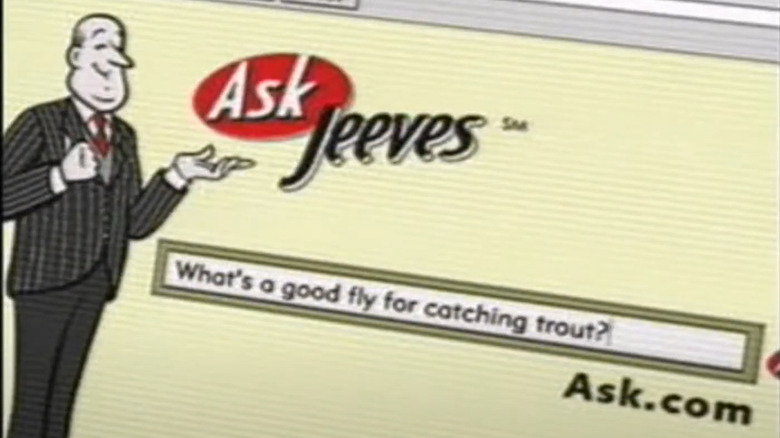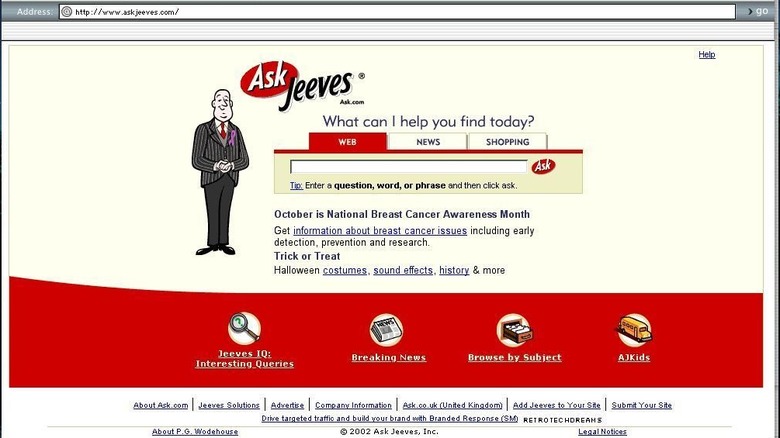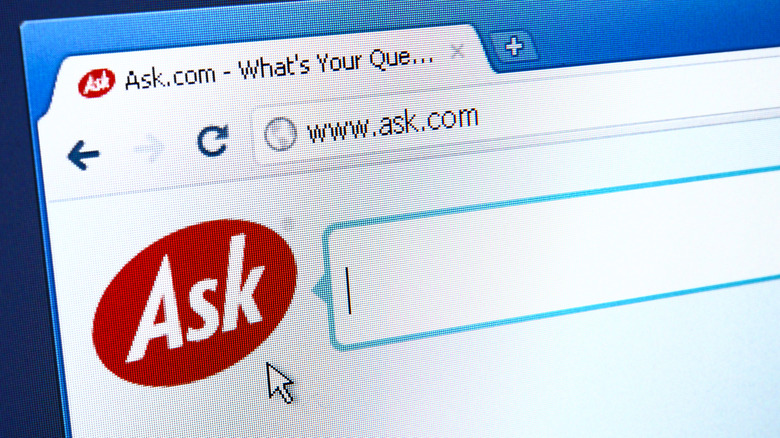What Happened To Ask Jeeves?
At the risk of alienating younger audiences, take a moment and ask yourself how you would have found the answer to this headline in the 90s. You might've consulted an online butler named Jeeves who, after deciphering your query, would deliver a "knowledge capsule", or information snapshot in conversational language akin to what modern users receive from AI chatbots. This was the promise made by Ask Jeeves founders Garrett Gruener and David Warthen when they launched their forward-thinking search engine in 1997, giving users an online concierge who presented the vast and disparate knowledge of the internet in organized snippets. The idea, much like its AI successors, took the internet by storm. Within a few years, the search engine handled over a million daily searches. When the company launched its initial public offering, it skyrocketed from $14 a share to a peak of $190.50.
At the turn of the century, Ask Jeeves seemed poised for internet stardom. But a year later, the internet bubble popped, and the company faced nearly half a billion dollars in losses. By the end of the decade, the company had weathered an industry-wide collapse, completed a multi-billion dollar sale, ditched its lovable mascot, and, finally, shuttered its search functions altogether. Nowadays, the pioneering search engine is known merely as an alternative search engine to Google and is relegated to the nostalgic scrapheap beside the obsolete tech gadgets of its era, like floppy disks, pagers, and Tamagotchi pets. What led to the lovable search engine's downfall?
A bubble bursts
Born out of a desire to make web searches easy for those without a degree in computer science (which was a much bigger problem in the '90s), Ask Jeeves' founders devised a search algorithm that resembles the models powering your favorite AI chatbot today. Entering a burgeoning search engine space, Ask Jeeves stuck out among competitors like Yahoo!, Alta Vista, and Excite with a customer service approach, using its lovable butler mascot, natural search language, and a host of innovative advertising techniques – including placing stickers on produce and sending mascot look-alikes to public spaces. Within its first year, the site was fielding 300,000 searches a day. By year two, Ask Jeeves had tripled that mark. When the company decided to go public in 1999, its stock skyrocketed by 364% on the first day of trading, despite never sniffing profitability.
Such enthusiasm was founded largely on unbridled optimism rather than financial results. At the time of its IPO, Ask Jeeves' expenses were nearly 4.5 times its revenue. This wasn't unique in the burgeoning internet landscape – monetization was often a secondary concern behind market capitalization for companies of that era. The ubiquity of this lack of financial success to underpin sky-high investments led to one of the largest market recessions in modern history. When rising interest rates, a recession in Japan, and unsteady advertising revenues (among other factors) put pressure on internet stocks, eventually bursting the dot-com bubble. Think of it like a game of musical chairs with Ask Jeeves standing there without the for-profit business model (the proverbial chair) to fall back on. Following the crash, Ask Jeeves lost $425 million and its stock price plummeted to a meager 86 cents, roughly 221 times less than its peak value.
End of an era
Despite catastrophic losses, the dot-com bubble wasn't the end for the California-based company. Facing insolvency, Ask Jeeves reinvented itself by purchasing Teoma Technologies, enabling the company to deploy an expert ranking system that ordered results by their "authority" rather than popularity. An ad-partnership with Google, which accounted for 70% of Jeeves' revenue, plus innovations like site previews and search suggestions, breathed new life into the company, culminating in a $1.85 billion sale to internet mogul Barry Diller in 2005, joining a portfolio that included Expedia, Ticketmaster, and Match.com.
Unfortunately for Ask, which ditched the butler and rebranded itself as Ask.com, these improvements couldn't prevent the search engine from being dwarfed by Google's dominance. Founded just one year after Ask, Google's superior algorithm dominated its competition. Just five years after its founding, Google handled a third of the internet's search inquiries, while Ask's market share was less than 3%. By 2006, "Google" was a verb in both the Merriam-Webster and Oxford dictionaries.
Finally, Ask shuttered its search engine in 2010, consolidating to its toolbar extension and handing over search results to a third party. According to a statement Diller gave to Bloomberg, the company realized "you can't compete head on with Google." In retrospect, the pivot was just another domino in Google's rise to dominance. In the fifteen years since, Google's share of U.S. searches grew from 65% to a staggering 91%, making the company so powerful that some users are asking how to de-Google their lives. Unfortunately for the nostalgic, it doesn't appear that the search giant has any plans to incorporate an endearing butler into its business model any time soon.


